 There’s just something
compelling about the simplicity of the shooter. No real strategy is involved; there are no
tactical decisions to be made, and the control basically consists of one joystick and one
button. Yet somehow the genre persists. Shooters endure from system to system relatively
unchanged whether they’re being played on the newest powerhouse platform or the dusty
antique in your closet. The graphics get a little better, the names change (sometimes),
and any given title will have a small distinguishing feature to remind you that you
haven’t played this game before.
There’s just something
compelling about the simplicity of the shooter. No real strategy is involved; there are no
tactical decisions to be made, and the control basically consists of one joystick and one
button. Yet somehow the genre persists. Shooters endure from system to system relatively
unchanged whether they’re being played on the newest powerhouse platform or the dusty
antique in your closet. The graphics get a little better, the names change (sometimes),
and any given title will have a small distinguishing feature to remind you that you
haven’t played this game before. So the question persists; what is it about shooters that makes us
want to keep playing them, and what makes one shooter better than another? The answer to
both of these questions is the same, but surprisingly difficult to articulate. Playing a
good shooter is a nearly Zen experience. As your fingers twitch across the sweaty
controller, and your eyes phase into the mesmerizing pulse and flash of the TV screen,
reality fades away. The mind knows only action and reaction coupled with the intense drive
to blow the hell out of the alien bastards, save the earth, rescue the hostages, throw
down some tyranny or another, or perform some other equally heroic task. Hours, days, and
sometimes weeks fade away under precisely these conditions.
So the question persists; what is it about shooters that makes us
want to keep playing them, and what makes one shooter better than another? The answer to
both of these questions is the same, but surprisingly difficult to articulate. Playing a
good shooter is a nearly Zen experience. As your fingers twitch across the sweaty
controller, and your eyes phase into the mesmerizing pulse and flash of the TV screen,
reality fades away. The mind knows only action and reaction coupled with the intense drive
to blow the hell out of the alien bastards, save the earth, rescue the hostages, throw
down some tyranny or another, or perform some other equally heroic task. Hours, days, and
sometimes weeks fade away under precisely these conditions.
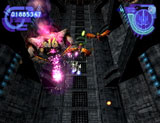 Even really
good shooters aren’t for everybody; we always know what to expect from them, and when
they deliver to their audience, everyone is happy. On the other hand, really bad shooters
aren’t for anybody. Since the core shooter audience are the ones buying the game, the
loyal fan base is the first to get burned by a bad shooter. Fortunately for shooter fans
across the world, Silpheed is a good shooter, which should come as no surprise to those
familiar with Working Designs.
Even really
good shooters aren’t for everybody; we always know what to expect from them, and when
they deliver to their audience, everyone is happy. On the other hand, really bad shooters
aren’t for anybody. Since the core shooter audience are the ones buying the game, the
loyal fan base is the first to get burned by a bad shooter. Fortunately for shooter fans
across the world, Silpheed is a good shooter, which should come as no surprise to those
familiar with Working Designs.
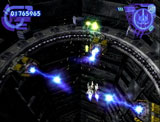 A three star
rating might seem low for a game that, for the most part, delivers when it needs to, but
Silpheed will not have an across the board appeal. A select audience will enjoy it
immensely; everyone else will find it mildly diverting but will have exhausted their
desire to play after a few hours.
A three star
rating might seem low for a game that, for the most part, delivers when it needs to, but
Silpheed will not have an across the board appeal. A select audience will enjoy it
immensely; everyone else will find it mildly diverting but will have exhausted their
desire to play after a few hours.
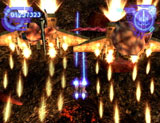 True to
conventional form, Silpheed is a top down space shooter. The graphics are pretty with good
use of texture and color to keep things interesting and to give each stage a unique feel,
but as you might expect from a 2D shooter, you won’t be blown away. You play the
pilot of the last remaining Silpheed craft. As such, there are no quick continues once
your ship explodes. Instead, your Silpheed has ten shield counters. Every time you’re
hit you loose one counter. When they’re all gone your game is over. At select spots
you meet a refueling tanker that will recharge three of your shield counters and allow you
to switch weapons. At the end of each level, all of your shield counters are restored.
While there are no quick continues, you can restart at the beginning of the current level.
True to
conventional form, Silpheed is a top down space shooter. The graphics are pretty with good
use of texture and color to keep things interesting and to give each stage a unique feel,
but as you might expect from a 2D shooter, you won’t be blown away. You play the
pilot of the last remaining Silpheed craft. As such, there are no quick continues once
your ship explodes. Instead, your Silpheed has ten shield counters. Every time you’re
hit you loose one counter. When they’re all gone your game is over. At select spots
you meet a refueling tanker that will recharge three of your shield counters and allow you
to switch weapons. At the end of each level, all of your shield counters are restored.
While there are no quick continues, you can restart at the beginning of the current level.
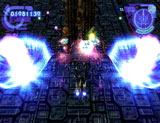 Silpheed’s
most compelling feature is the ability to equip a different weapon to each side of the
ship. It’s a lot of fun to try out the variety of weapons, and while some levels are
more suited to certain weapons it quickly becomes apparent that some weapons are simply
better than others. New weapons are unlocked as your score increases which leads us to the
first area of potential frustration. If you have to continue from the beginning of a
level, your score is reset to zero. Since the first couple of levels are the easiest you
can build a high score early on. If you have to continue on the later levels, resetting
your score to zero effectively eliminates the possibility of unlocking any new weapons, so
you will have to complete the game with the weapons you have already unlocked. This means
it is imperative to either never die before unlocking all the weapons, which is incredibly
hard, or at the very least unlock all the weapons you want to use. Since the average gamer
will not put in the time required to get good enough to unlock all the weapons, many will
give up in frustration, and others will simply never see all the options the game has to
offer.
Silpheed’s
most compelling feature is the ability to equip a different weapon to each side of the
ship. It’s a lot of fun to try out the variety of weapons, and while some levels are
more suited to certain weapons it quickly becomes apparent that some weapons are simply
better than others. New weapons are unlocked as your score increases which leads us to the
first area of potential frustration. If you have to continue from the beginning of a
level, your score is reset to zero. Since the first couple of levels are the easiest you
can build a high score early on. If you have to continue on the later levels, resetting
your score to zero effectively eliminates the possibility of unlocking any new weapons, so
you will have to complete the game with the weapons you have already unlocked. This means
it is imperative to either never die before unlocking all the weapons, which is incredibly
hard, or at the very least unlock all the weapons you want to use. Since the average gamer
will not put in the time required to get good enough to unlock all the weapons, many will
give up in frustration, and others will simply never see all the options the game has to
offer.
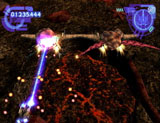 The lack of
a save feature, although relatively standard for a shooter, exasperates the above problem.
In addition, in order to finish the game the earliest levels will have to be played and
replayed and replayed some more before the later levels can even be seen. Those wary of
excessive repetition will quickly be put off.
The lack of
a save feature, although relatively standard for a shooter, exasperates the above problem.
In addition, in order to finish the game the earliest levels will have to be played and
replayed and replayed some more before the later levels can even be seen. Those wary of
excessive repetition will quickly be put off.
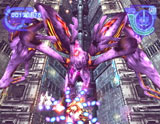 Yet in all
fairness, those wary of excessive repetition probably aren’t big shooter fans to
begin with. Recommending Silpheed to shooter fans is relatively easy. It delivers what it
needs to, looks good doing it, and is fun to play, but those not interested in shooters
will find nothing in Silpheed to change their mind.
Yet in all
fairness, those wary of excessive repetition probably aren’t big shooter fans to
begin with. Recommending Silpheed to shooter fans is relatively easy. It delivers what it
needs to, looks good doing it, and is fun to play, but those not interested in shooters
will find nothing in Silpheed to change their mind.
